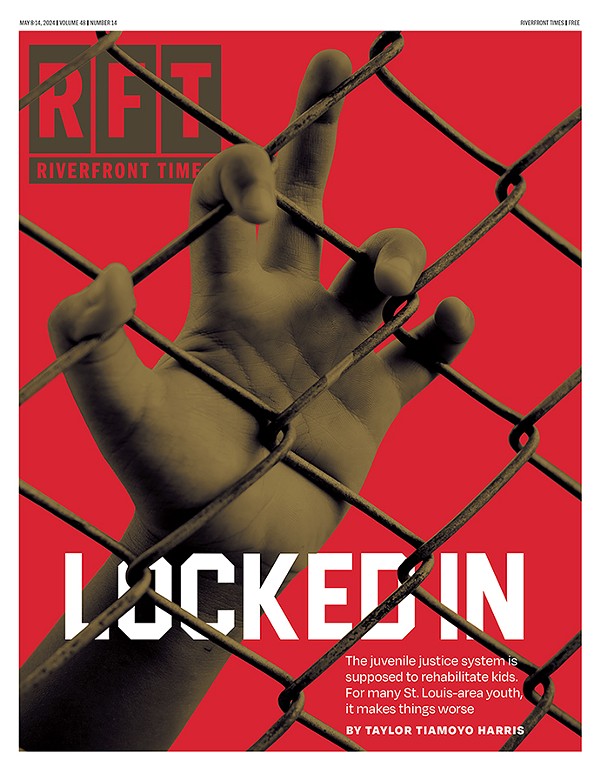
Ann Leckie shuffles the stack of rejection letters she has spread across a small wooden table. Seated in an engulfing armchair in the foyer of the Webster University library, the gray-haired 48-year-old peers down at them through a set of bookish, black-framed glasses. She's soft-spoken and almost shy, but there are subtle hints that she is not a typical suburban mother of two — like her glittery, bright-orange lacquered toenails under the table, for example.
"This one's my favorite," Leckie whispers at a library-appropriate volume. She slips out a sheet bearing the all-caps letterhead of Analog Science Fiction and Fact.
"'Dear Mr. Leckie,'" she recites. "'Thank you for giving us the opportunity of looking at this manuscript, but I have found it not quite suitable to our present needs.'"
She laughs.
"I'm sure it was just a typo," she says.
Back then Leckie was struggling to publish anything, anywhere; it was a time when her few successes included a non-bylined bodice-ripper for True Confessions called "He's My Lover On The Telephone But I've Never Seen His Face." She penned many of these early works at one of the sunlit tables on the third floor of Webster University's library.
"My rule," Leckie says, "was that when I got a rejection, I had to send the piece back out the same day. I always knew the next place it was going to go when it was rejected."
Leckie — who has lived in St. Louis almost her entire life — has the luxury of laughing at these past failures. That's because her 2013 debut novel, Ancillary Justice, is one of the most critically acclaimed science-fiction books to come out in recent history and she's poised to become the genre's next big star. Leckie estimates it has sold 30,000 copies so far, and it's been translated into ten languages.
"Part of it has to do with who she is," says John Scalzi, author of the popular science-fiction blog Whatever. "She is Ann Leckie, she's a woman, a mother who spent time raising her kids. She has the background in music. All of that came together to create a voice that is unique. That's one of the reasons Ancillary Justice is doing so damn well with the awards this year. Everybody gets it. This is a singular voice."
Just five weeks ago Leckie walked onstage in a San Jose Marriot to receive the Nebula Award for Best Novel, an honor that's been stamped on the covers of science fiction's greatest works for the past half century. The Science Fiction & Fantasy Writers of America, the preeminent literary society in the United States for the genres, selects the winners by membership vote every spring. Just a couple of weeks before that, Leckie's UK agent accepted the Arthur C. Clarke Award on her behalf at the Royal Society in London. A panel of judges named her book the best novel published in England in 2013.
"I can talk easily about what I did yesterday morning or what I had for dinner last night.... But when I get to the part about winning the Clarke, I mostly just say, 'Oh, my God' a lot, with an occasional, 'Holy fuck,'" Leckie wrote that night on her blog.
Next, Ancillary Justice is up for a Hugo Award, which will be voted on by the members of the World Science Fiction Convention in August. Founded in 1953, the Hugo is the oldest and arguably most prestigious mark a science-fiction novel can attain.
The Nebula, Arthur C. Clarke and Hugo awards are the Triple Crown of science-fiction writing. If Ancillary Justice claims the Hugo, it will become the first novel to win all three. After years toiling in obscurity, Leckie's given up trying to wrap her mind around how quickly she and her gun-slinging, galaxy-traversing heroine, Breq, have climbed to critical and popular adoration.
"It's like lightning striking," she says.
Even without the Hugo, Ancillary Justice — a so-called "space opera," a term for sweeping intergalactic epics like Star Wars — has received glowing praise for its deftly feminist approach to language and treatment of gender. The book has drawn comparisons to the best works of Ursula K. Le Guin, C.J. Cherryh and Iain M. Banks. Leckie's publisher, Orbit Books, has already signed her to complete a trilogy set in the same universe.
Leckie's success — and the fact that it was achieved with a novel that not only has a strong female protagonist, but also refers to all of its characters, male or female, as "she" — comes at an interesting time. Barely a year ago the science-fiction community was tearing itself apart over sexism allegations. Seemingly in response, the 2013 Nebula Awards marked the first time in its nearly 50-year history that all of the winners were women.
Despite that fact, Leckie knows this is not the only time that her literary community has struggled internally with issues of gender and equality.
"Sometimes I feel kind of cynical about it," she admits. "I would love to think that this is a sign of critical mass."






